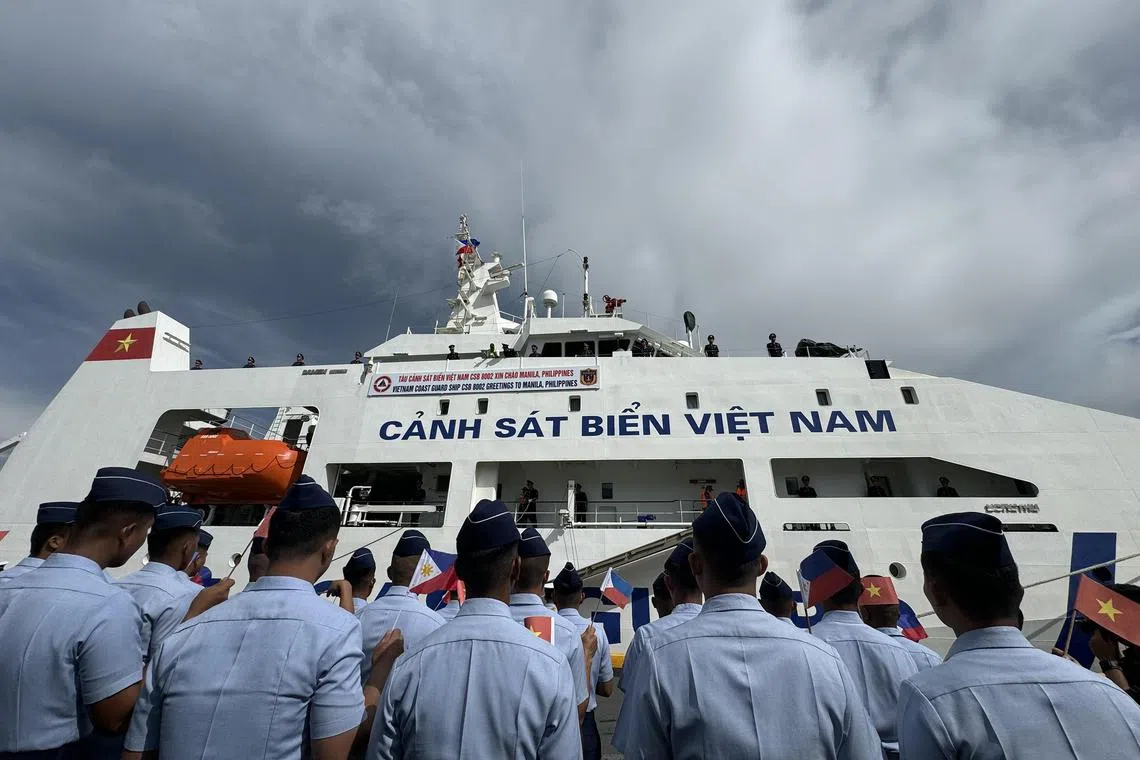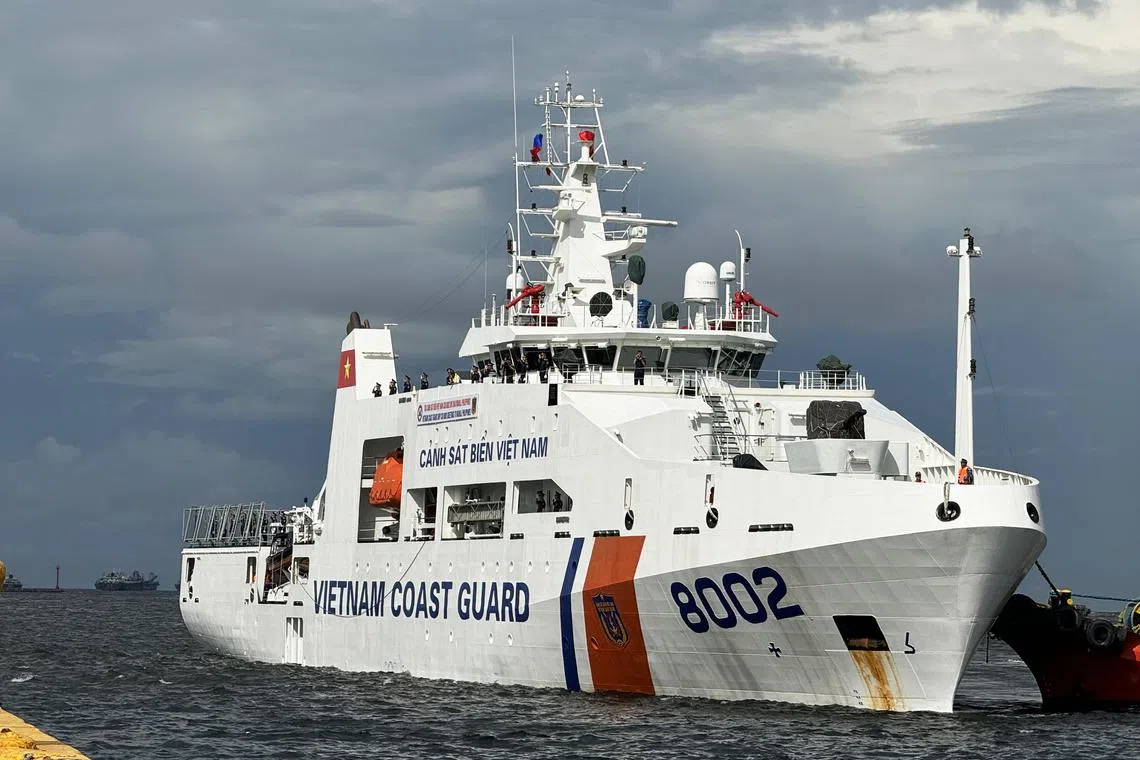Philippines, Vietnam to hold first joint maritime drills amid tensions in South China Sea
Sign up now: Get ST's newsletters delivered to your inbox

The Philippine Coast Guard welcoming Vietnam's CSB 8002 vessel as it arrived for a five-day visit in Manila on Aug 5.
ST PHOTO: MARA CEPEDA
Follow topic:
MANILA – The Philippines and Vietnam are set to hold their first joint maritime exercises on Aug 9, a historic move seen as a way to deepen trust between the two South-east Asian nations that have resisted Beijing’s increasing assertiveness in the South China Sea.
Though the two countries have competing claims in the disputed waterway, the Philippine Coast Guard (PCG) welcomed its Vietnamese counterparts as they docked at the Port of Manila on Aug 5.
Vietnam has been speeding up its artificial island-building pace in the South China Sea over the past months, while tensions have been increasing between China and the Philippines over the latter’s resupply missions to a remote military outpost
Beijing’s rising aggression in the region, however, has pushed Manila and Hanoi to beef up their defence and cooperation.
Vietnam’s CSB 8002 patrol vessel will end its five-day goodwill visit this week by sailing through the waters of Manila Bay, which faces the South China Sea, along with Filipino sailors in their own vessel, to conduct search and rescue operations, fire and explosion training, and passing or communication exercises on Aug 9.
The drills include simulating the rescue of fishermen in distress in the South China Sea, said PCG spokesman Armand Balilo in an interview with reporters after CSB 8002’s arrival. He insisted that the historic coast guard drills between the two countries are not directed against China.
But, he said the exercises are setting a good example for the coast guard fleets of other South China Sea claimants to explore ways to work together despite their nations’ overlapping maritime claims.
“This is important because we’re building a partnership, and we are showing the world that it is possible for two countries that have a problem in the West Philippine Sea to still cooperate,” said Rear-Admiral Balilo. “We can set a template to build a stronger relationship that other claimants may follow in the future.”
The West Philippine Sea is the official term Manila uses to refer to the eastern parts of the South China Sea that lie within the Philippines’ 200-nautical mile exclusive economic zone (EEZ) that China is also claiming.
Beijing claims sovereignty over almost the entirety of the South China Sea, including parts of the EEZs of the Philippines, Vietnam, Malaysia, Brunei and Indonesia.
The Permanent Court of Arbitration in 2016 ruled that China’s claims had no legal basis. But Beijing refuses to recognise the ruling and has instead ramped up its military presence and artificial island-building activities in the waters.
Philippine President Ferdinand Marcos Jr’s visit to Vietnam in January 2024 yielded two pacts, under which the two countries agreed to improve cooperation of their coast guards and build trust by preventing untoward incidents in the South China Sea.
Colonel Hoang Quoc Dat, vice-commander of the Vietnam Coast Guard Region 2, said the Aug 9 drills set a “solid foundation” for the two countries and will help ensure regional peace and stability.
“This will promote and enhance the efficiency of information sharing and the coordination in maritime law enforcement in accordance with international law, thereby contributing to the preservation and protection of the regional maritime security and safety,” he said in a speech upon his arrival in Manila.
The Philippines and Vietnam recently filed their respective claims before the United Nations to an extended continental shelf in the South China Sea, but both expressed willingness to talk to each other to resolve any issues.
Rear-Adm Balilo said the continental shelf issue would not get in the way of the coast guard cooperation with Vietnam.

The Vietnam Coast Guard’s CSB 8002 arriving at the Port of Manila on Aug 5.
ST PHOTO: MARA CEPEDA
The coast guard drills are unprecedented for the Philippines and Vietnam, as their respective political systems previously limited what the countries could do in terms of maritime cooperation, said geopolitical analyst Don McLain Gill of the De La Salle University in Manila.
He said China’s aggressive actions have pushed Manila and Hanoi closer together.
“Vietnam may have a different internal calculation in addressing China’s belligerence (compared with the Philippines). And of course, Vietnam, not being a treaty ally of the United States or any other country, has that level of strategic autonomy, which may give it some flexibility,” he said.
“But there are challenges (posed by China) that Vietnam is now realising will not go out anytime soon. So, cooperation with immediate neighbours is necessary,” added Mr Gill.
The exercises also boost confidence that Asean centrality can be achieved in the future through effective coast guard diplomacy, said geopolitical analyst Chester Cabalza, president of Manila-based think-tank International Development and Security Cooperation. Asean centrality is the idea that member states should be the driving force behind geopolitics in the region.
“It sets aside and quashes the belief that there is disunity among neighbours in the region amid overlapping territorial and maritime claims in the South China Sea,” said Mr Cabalza.
“The strong message from the interoperable and joint sail of the Philippine and Vietnamese coast guard vessels in Manila Bay, the busiest commercial maritime domain in the country’s capital, shows that maritime rule of law and appreciation of international laws should prevail,” he added.


